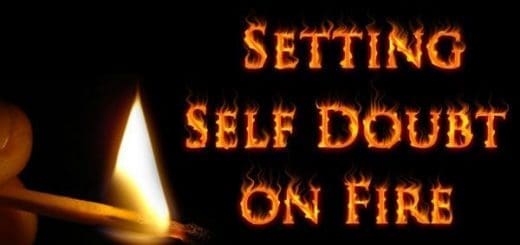The Horror Tree Presents… An Interview with Douglas Wynne
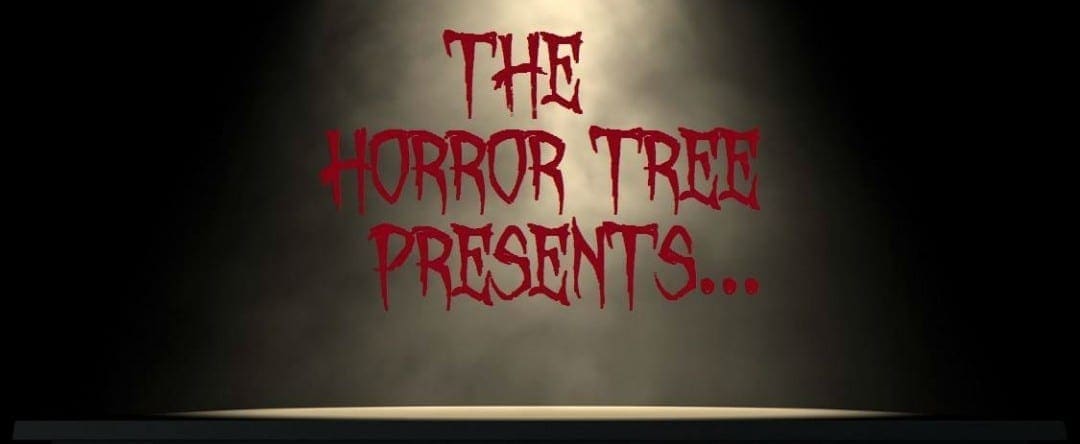
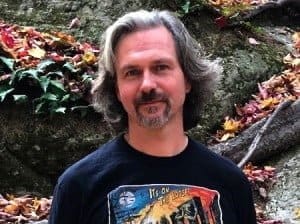 Ruschelle: Nice to have you in the hottest of the hot seats here at The Horror Tree. Okay, it’s just a little warm. And that’s only because I’ve been sitting in it…I may or may not have created an organic geothermal reaction on your seat. Damn tacos…
Ruschelle: Nice to have you in the hottest of the hot seats here at The Horror Tree. Okay, it’s just a little warm. And that’s only because I’ve been sitting in it…I may or may not have created an organic geothermal reaction on your seat. Damn tacos…
Speaking of tacos, which are awesome and meaty, tell us a little about yourself that no one but your therapist or parole officer knows.
Doug: Happy to be here. I think. You sure do cut to the chase! Let’s see…if I had a parole officer, it would probably be for road rage, which I try to manage with Buddhist mind training exercises. And I think therapists are great, but the only time I’ve been to see one was to get a prescription for public speaking anxiety when my first book was coming out and I was scheduled to do appearances at bookstores. It’s weird because I used to play in a rock band and never had stage fright about talking to crowds or singing, but reading to people was hardwired to the terror I experienced as a shy kid forced to read aloud in class. So that was a real obstacle when I finally got serious about fiction writing and promoting my books. Now, four books later, I love doing events.
Ruschelle: You shared your expertise at the Bigfoot Institute in February. Awesome! School us here at The Horror Tree about the creature.
Doug: Yeah, that was weird. My friend Tom Deady and I gave a writing workshop to students at the 826 Boston writing program in Roxbury. I almost couldn’t find the building, because the graphics on the glass door list it as the Bigfoot Research Institute. There’s even a giant stuffed yeti in the lobby next to a corkboard of Bigfoot tabloid stories, but the writing program seems to be the only thing going on there. So I still have no idea what that was about. But Tom and I realized afterward that if we really wanted to prepare these kids to earn an income as fiction writers, we should have advised them to write Bigfoot adult content! And it was right under our noses the whole time.
Ruschelle: What can you tell us about ‘Bigfoot adult content?’ And don’t leave out any juicy details?
Doug: all I know is I’ve heard it’s very lucrative. And I wear a size 13, so maybe I should give it a shot.
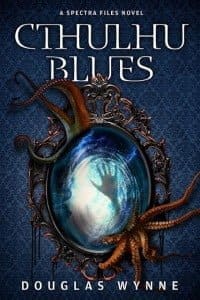 Ruschelle: Your books, from the Spectra Files Trilogy, are wrapped in the ancient tentacles of the Old Ones. Tell us about your ‘love’ of Lovecraft and how it influenced Red Equinox, Black January and Cthulhu Blues.
Ruschelle: Your books, from the Spectra Files Trilogy, are wrapped in the ancient tentacles of the Old Ones. Tell us about your ‘love’ of Lovecraft and how it influenced Red Equinox, Black January and Cthulhu Blues.
Doug: Lovecraft’s Cthulhu mythos has become a sub genre unto itself, and it can be a lot of fun writing things that connect to that shared world. I think it’s one of the first shared worlds in fiction, which Lovecraft encouraged back when his friends started riffing on his material in the 1930s. In recent years, it has kind of exploded. I grew up reading Lovecraft along with the other horror icons, and I’ve always known that cosmic horror was something I wanted to do, something that resonates with me more than, say, zombies or vampires. I love mythology, and I love the philosophical aspect of occult horror. And even though it can be excessive in Lovecraft’s own work, I also like horror stories that have a lyrical voice, like you find in Clive Barker’s work—another huge influence for me. The SPECTRA files trilogy gave me a chance to explore that stuff in a modern setting with a more contemporary voice and cast of characters. Lovecraft is problematic when it comes to the racism and gynophobia that underpins the cosmic dread. So I deliberately set out to play against that and to write a story that would also explore how those fears of the other are still with us in the age of ubiquitous surveillance and high-tech terrorism. Even the fact that the books are fast-paced thrillers goes against the grain of Lovecraftian fiction, which often works best as atmospheric short stories. I knew it would either be a total mess or a thrill for fans of the genre.
Ruschelle: How long did it take to write your trilogy?
Doug: I started Red Equinox in 2013 and Cthulhu Blues was published in 2017, so about four years.
Ruschelle: Did you have the whole series plotted out from beginning to end or did you just have a rough outline of each book and let inspiration complete the rest?
Doug: I don’t outline much. I make a lot of notes about the characters and the premise until I feel like I know enough to dive in and start discovering the story by writing it. I always say that inspiration comes from writing, not the other way around. But I will make forecast notes every 30,000 words or so—just brainstorming where I see things headed based on the conflicting motivations of the characters. That leaves room for a good amount of improvisation and surprise for me as a writer. I think a storyteller’s subconscious mind can be very nimble at making connections under pressure, and those are often better than a premeditated plot. It can be stressful, but I like to provoke that in myself by making it a necessity for hitting my daily word count and moving the story forward.
Ruschelle: Of all the Lovecraft Gods, which one do you resonate with the most? Ya know, the one you’d enjoy chugging a craft beer with at the Miskatonic bar?
Doug: Nyarlathotep without a doubt. Tall, dark, and mysterious.
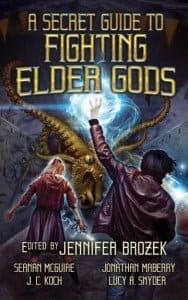 Ruschelle: You’re a Black Belt! Has that skill made its way into any of your stories such as The Secret Guide to Fighting Elder Gods?
Ruschelle: You’re a Black Belt! Has that skill made its way into any of your stories such as The Secret Guide to Fighting Elder Gods?
Doug: I’ve been doing various martial arts for about a dozen years now. I was not a very athletic kid—always had my head in a book or my hands on a guitar—so the training has definitely enhanced my awareness of the physical side of life. I’m sure my Tae Kwon Do and karate have informed every fight scene I’ve ever written, whether or not the characters have any training or skill. I also wrote a whole novel influenced by Iaido, the samurai sword art. That’s Steel Breeze, a crime thriller about a modern samurai serial killer.
As for my story in The Secret Guide to Fighting Elder Gods, it features a character with no self-defense skills, and I doubt he would fare much better if he had them. But he is a lifeguard—a job I had as a teen. You’ll have to pick up the book to see if that helps. It was a fun story to write because it takes place on Plum Island in Newburyport, near where I live. I feel lucky to be sharing the table of contents with Seanan McGuire, Jonathan Maberry, and a bunch of other terrific writers I admire. I’m told the book will be out in April.
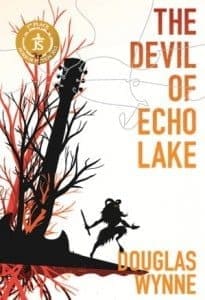 Ruschelle: If you could be any character from any of your books and stories, who would you choose to be?
Ruschelle: If you could be any character from any of your books and stories, who would you choose to be?
Doug: The cool thing about writing is that I kinda get to be all of them, right? But that’s probably a copout. When I was a kid, I wanted to be Batman first, then Dracula, then an astronaut, then a rock star. So I guess I’d like to be Billy Moon from The Devil of Echo Lake because he got to be the rock star I never was. But only for like a day. Billy’s kinda screwed up.
Ruschelle: A few years back, you were on a panel of writers at The Merrimack Valley Halloween Book Festival. You were hob knobbing with the spawn of the modern master of horror, Joe Hill! Tell us about the Cons you’ve been on and becoming best friends with Joe. I hear you guys fight monsters with pointy sticks in blanket forts in your jammies while snacking on goblin spleen… and popcorn!
Doug: That sounds awesome! Totally not true, but awesome. I met Joe when I interviewed him for Dark Discoveries magazine right before The Fireman came out. Great guy. Very funny. I can’t say we’re besties, but we did spend a day playing with an antique fire truck in a cemetery for a photo shoot my wife Jen did. So that was almost as cool as what you described. I’m a big fan of Joe’s books. And with the fire truck, I think we both felt like we were ten again.
Pretty sure the panel we did that you’re thinking of was the apocalyptic fiction one I moderated at Necon, but the Merrimack Valley Halloween Book Festival is also an amazing mini-con. That’s where I got to share a signing table with Joe’s brother Owen this past year. Another great guy. I get the impression that the King family is made up of smart, kind people all around. Horror writers in general are some of the nicest people you could hope to meet. I feel very lucky to have struck up little friendships with so many of the monstrously talented people I admire. When I started publishing six years ago, I didn’t know anyone, and that’s been one of the great joys of this crazy and often solitary occupation.
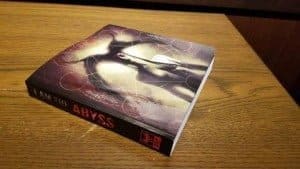 Ruschelle: You wrote a story specifically for the anthology, I Am The Abyss. The theme of the tome centers on the afterlife as characters are “trapped in self-created worlds.” Could you give us a little insight on your character and the inspiration behind such a cerebral tale?
Ruschelle: You wrote a story specifically for the anthology, I Am The Abyss. The theme of the tome centers on the afterlife as characters are “trapped in self-created worlds.” Could you give us a little insight on your character and the inspiration behind such a cerebral tale?
Doug: When Dark Regions Press announced that they were doing an anthology of novelettes focused on the after-death realms experienced by characters based on their subconscious projections, I was immediately attracted to it. I’ve been interested in Tibetan Buddhism for decades (Jen and I even got married in a Tibetan refugee village in India, organized by a monk friend of ours). Anyway, if you’ve ever checked out the Tibetan Book of the Dead, you know that that’s the basic idea behind what they call the bardo states, or ‘in between’ realms. I did some historical research for the story and created a character who used to be a monk but relinquished his robes when the CIA offered to train him as a resistance fighter and air drop him back into Chinese occupied Tibet in 1961. That was an actual covert operation called ST Circus, which to this day not many people know about. So it was the perfect project for me to explore some themes close to my heart. I’ve also written a longer novella that’s a sequel to my Abyss story. It takes place in New York City’s Chinatown in the 1990s, and I’m shopping it around right now. That one’s called, The Wind in My Heart.
Ruschelle: The sneak peek of I Am The Abyss from publisher, Dark Regions Press looks awesome. With its unique 8×8 trim size and gorgeous full-color paintings, this book will be a prize to anyone’s collection. What else makes this anthology special for both writers and readers?
Doug: The book has been a long time in the making, in part because of how ambitious the production is, but I hear the paperbacks are starting to ship to kickstarter backers now with the standard orders and limited hardcovers to follow in the next few months. There’s a version signed by all of the authors and artists, and the artwork is just stunning. Conceptually, I can’t think of anything else quite like it. It’s a wonderfully unique but thematically unified blend of dark fantasy and horror.
Ruschelle: Is there a piece of writing advice that you find has become your mantra?
Doug: The longer I do this, the more I realize that every writer is different and every project is different and the only solid advice is: Do whatever works for you. Whatever it takes to get words on the page. For me, personally, the best mantra has been the one Stephen King popularized: The book is the boss. Every story has its own needs and even its own voice and it’s the writer’s job to fulfill that potential without forcing it to be something else. It’s a bit like parenting in that regard.
Ruschelle: Back to the Elder Gods, is there a team up you’d love to see happen with one of our Modern Gods? Like, maybe Bastet, Vishnu… or Marvel’s Thor?
Doug: Horus and Ganesha in a buddy cop movie.
Ruschelle: I was checking you out on Twitter (I always stalk my prey….I mean authors) and noticed a post on the internet hysteria which is Momo. What are your thoughts on Momo as a parent and as a writer?
Doug: Yeah, so what I was saying on social media is that, for better or worse, devices are embedded in our kids’ lives now, and parents—even those who are pretty tech savvy—are terrified that they don’t understand all of the dangers that this connectivity and digital saturation presents to kids. The New York Times today published an article with the header, “The real ‘Momo Challenge’ is the terror of parenting in the age of YouTube. That’s a growing area of fear and anxiety, and I expect that YouTube and shared world games like Minecraft are about to become the breeding ground for a hysteria to rival the Satanic panic of the 80s. Hoaxes and rumors will thrive. But the scariest part is that some of the fear will be justified.
Ruschelle: Where do you look for inspiration when your muse decides she needs a vacation to go visit her mother?
Doug: Anywhere. Everywhere. Songs, books, the news. Mythology, psychology, family life. Whatever the cat dragged in. Any one idea by itself probably won’t provide the spark, but the friction between two unrelated ideas colliding is where the magic happens.
Ruschelle: What are you cooking inside your head’s Eazy-Bake Oven? Could you give us a little taste?
Doug: Your question about the Momo meme ties into that. I’m currently pitching a novel called His Own Devices. It’s a domestic cyber thriller with a supernatural twist. Here’s the hook: When Jessica discovers that her young son’s digital addictions have lured him into a dark relationship with a psychotic YouTube celebrity, it may be too late to stop a deadly game.
Thank you so much for sitting down with me and your newfound fans here at the Horror Tree. Where can your stalkers find you on the www?
- About the Author
- Latest Posts
Ruschelle Dillon is a freelance writer whose efforts focus on the dark humor and the horror genres. Ms. Dillon’s brand of humor has been incorporated in a wide variety of projects, including the irreverent blog Puppets Don’t Wear Pants and novelette “Bone-sai”, published through Black Bed Sheet Books as well as the live-action video shorts “Don’t Punch the Corpse” and “Mothman”. She also interviews authors for the Horror Tree website.
Her short stories have appeared in various anthologies and online zines such as Strangely Funny III, Story Shack, Siren’s Call, Weird Ales- Another Round and Women in Horror Anthology Vol. 2, Sanitarium Magazine, Dark Voices and Fear and Fables. Her collection of short stories, Arithmophobia published by Mystery and Horror LLC, is available through Amazon & Barnes and Noble. Summer 2020, Black Bed Sheet Publishing will release her dark Novella, The Stain.


